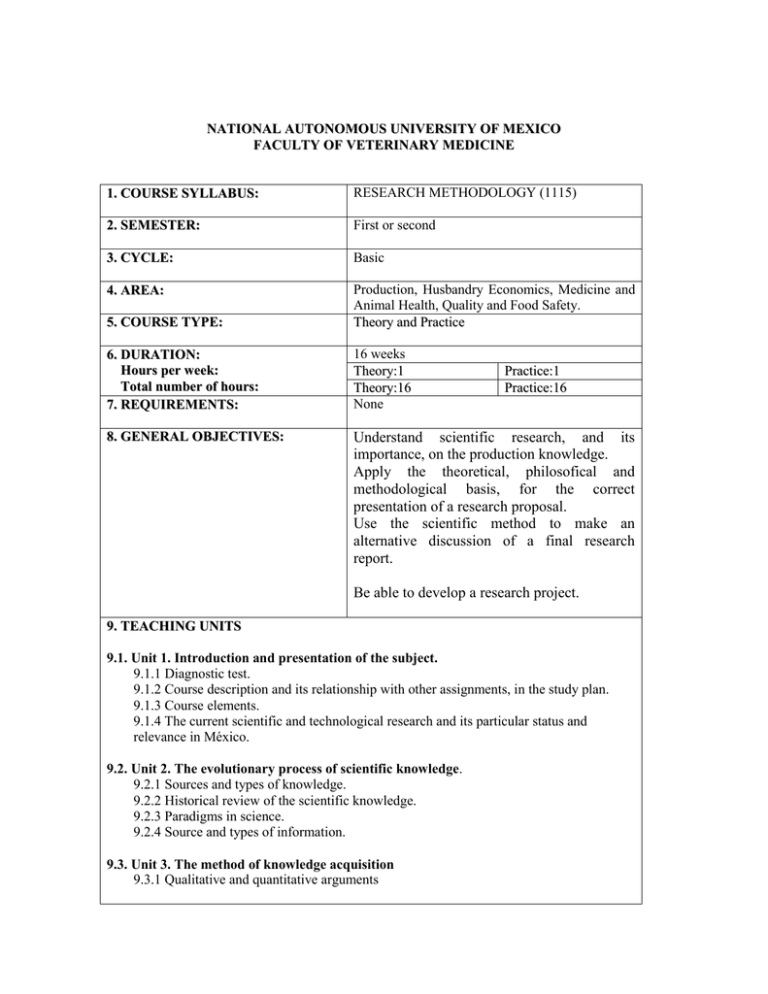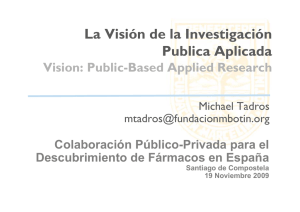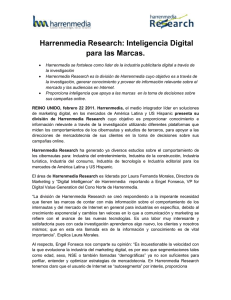RESEARCH METHODOLOGY
Anuncio

NATIONAL AUTONOMOUS UNIVERSITY OF MEXICO FACULTY OF VETERINARY MEDICINE 1. COURSE SYLLABUS: RESEARCH METHODOLOGY (1115) 2. SEMESTER: First or second 3. CYCLE: Basic 4. AREA: 5. COURSE TYPE: Production, Husbandry Economics, Medicine and Animal Health, Quality and Food Safety. Theory and Practice 6. DURATION: Hours per week: Total number of hours: 7. REQUIREMENTS: 16 weeks Theory:1 Theory:16 None 8. GENERAL OBJECTIVES: Understand scientific research, and its importance, on the production knowledge. Apply the theoretical, philosofical and methodological basis, for the correct presentation of a research proposal. Use the scientific method to make an alternative discussion of a final research report. Practice:1 Practice:16 Be able to develop a research project. 9. TEACHING UNITS 9.1. Unit 1. Introduction and presentation of the subject. 9.1.1 Diagnostic test. 9.1.2 Course description and its relationship with other assignments, in the study plan. 9.1.3 Course elements. 9.1.4 The current scientific and technological research and its particular status and relevance in México. 9.2. Unit 2. The evolutionary process of scientific knowledge. 9.2.1 Sources and types of knowledge. 9.2.2 Historical review of the scientific knowledge. 9.2.3 Paradigms in science. 9.2.4 Source and types of information. 9.3. Unit 3. The method of knowledge acquisition 9.3.1 Qualitative and quantitative arguments 9.4. Unit 4. Methods and types of research in veterinary medicine. 9.4.1 The research methods in factual and empirical sciences. 9.5. Unit 5. Planning of the investigation and structure of a research protocol. 9.5.1 Selection of the subject and exposition of the problem. 9.5.2 Establishment of the objectives. 9.5.3 The antecedents and significance of the problem. 9.5.4 The methods. 9.5.5 The chronogram. 9.5.6 Analysis of feasibility. 9.5.7 Bibliography. 9.6. Unit 6. Structure of a final research report. 9.6.1 Introductory components of the closing report of research. 9.6.2 Main components of the final report. 9.6.3 Complementary components of the final report. 9.7. Unit 7 Critical analysis of scientific publications. 9.7.1 Critical analysis scientific publication. 9.7.2 Design of protocols. 9.8. Unit 8. Ethical and legal aspects of the scientific research 9.8.1 Laws, Regulations, Norms. 9.8.2 Copyright and patents. 9.9. Unit 9. Examples of supporting programs for scientific research 9.9.1 Consejo Nacional de Ciencia y Tecnología, (CONACYT) 9.9.2 Sistema Nacional de Investigadores, (SNI) 9.9.3 Programa de Apoyo a Proyectos de Investigación e Innovación Tecnológica, (PAPIIT), Programa de Apoyo a Proyectos Institucionales de Mejoramiento de la Enseñanza, (PAPIME) 9.9.4 National and International Organizations. 10. BASIC BIBLIOGRAPHY 1. Day, R.A.: Como Escribir y Publicar Trabajos Científicos. Organización Panamericana de la Salud. Washington, D.C. 1996. 2. Dieterich, H.:Nueva Guía para la Investigación Científica. 13ª. ed. Planeta. México D.F. 2003. 3. Naghi, N.M.: Metodología de la Investigación. Limusa. México. 1990. 4. Russell, J.M.: Como Buscar y Organizar Información en las Ciencias Biomédicas. Limusa, México, 1993. 11. SUPLEMENTARY BIBLIOGRAPHY 1. Pérez, T.R.: De la Magia Primitiva a la Medicina Moderna. FCE.-ILCE. México, 1997. 2. Pérez, T.R.: ¿Existe el Método Científico? FCE.-ILCE. México, 2000. 3. Pineda, E. B. y Alvarado, E. L.: Metodología de la Investigación. OPS,Washington, D.C. 1994. 12. TEACHING METHODOLOGY The course is a mixture of lecture, discussion, and the other activities. The discussion sections are an integrate part of the course and attendance is required. In addition a series of written assignments troughout the semester. Theoretical approach: Recommended reading. Verbal exposition, with round discussion. Working groups. Checklists. Visual material (video). Practical approach: Field work. Research on specialized data bases. Research of basic bibliography on the library and using automated tools. 13. COURSE EVALUATION Write test Works and projects with preformed criteria Homework 14. REQUIREMENTS FOR TEACHING THE COURSE Veterinarian or Biological Sciences degree with teaching experience of one year minimum, research experience, and at least 5 scientific papers published in recognized journals.

